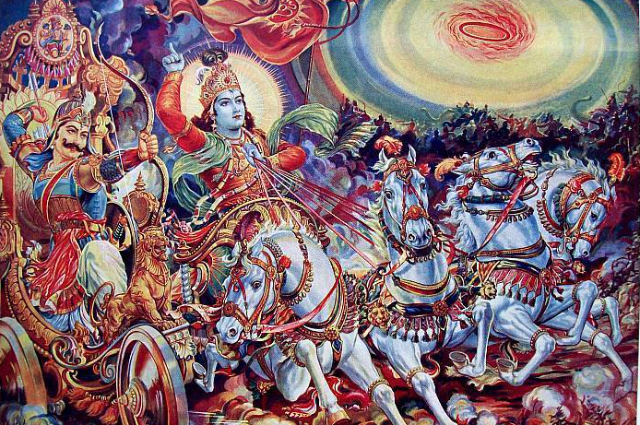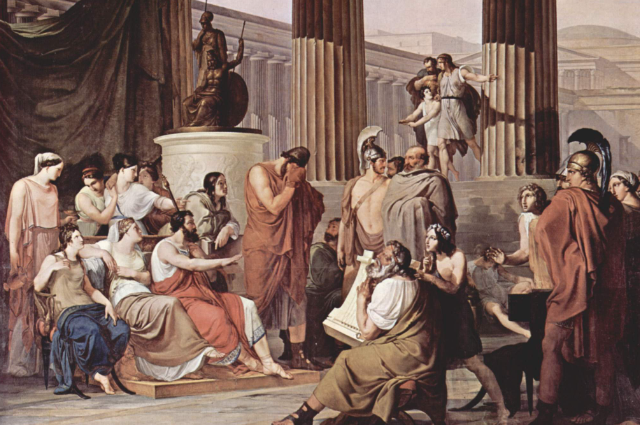Hymns, poems, and Stories are the backbone of civilization. Culture, empire, and people will rise and fall but their stories will prevail. Before history was written, before laws were carved in stone, myths and epics shaped the way people saw the world. Some stories were just entertainment, but others became foundations for cultures, defining ideas of morality, honor, and destiny. Among them, four stand tall- Mahabharata, Ramayana, Odyssey, and Iliad. These are not just old tales, we listen at night or watch in free time, they are reflections of the human condition, of war and peace, of love and loss, of gods and men.
From the battlefields of Kurukshetra to the shores of Troy, from Ram's exile to Odysseus’ endless journey, these stories have survived thousands of years, influencing everything from politics to pop culture. But what makes them timeless? What makes a story written centuries ago still relevant today?
Mahabharata: The Grand War of Dharma.
If epics were measured by size, Mahabharata would win hands down. Over 200,000 verses, making it the longest poem ever written. Though it's not only the size or length that makes it legendary, it’s the way story unfolds from different POV's, with such fluid connection, in a very small screen of time and depth of human emotion, moral dilemmas, and the philosophy embedded within that makes it an epic.
At its core, Mahabharata is about a throne war, so massive that it ends in an apocalyptic war, the Kurukshetra War. But the back stories that fueled it make us see everyone's reason as to why two factions of the same family, the Pandavas and the Kauravas, are fighting over a throne, but beneath this surface lies something deeper: a conflict between dharma (duty) and ambition. Every character, from the noble Yudhishthira to the tragic Bhisma, from the righteous Arjuna to the ruthless Duryodhana, is torn between what they want and what they must do. It's gritty, It's brutal, and it's the human psychological truth.
Lord Krishna, the god, serves as Arjuna’s charioteer and guide, in this battle. Helping him with his inner turmoil of fighting his own kin, His lessons are recorded and called Bhagavad Gita, spoken on the battlefield, is not just religious scripture, it’s a lesson in duty, destiny, and the meaning of life.
In many ways, Mahabharata is not a simple "good vs. evil" tale. It’s messy, complicated, and full of moral gray areas. Even its so-called heroes make questionable choices. But that’s what makes it real. In war, in life, in politics, nothing is ever black and white.
Ramayana: The Path of the Ideal Man
While Mahabharata questions morality, Ramayana defines it. It’s a simpler, more structured story, the tale of Lord Ram. The ideal man, and his journey to rescue his wife Sita from the demon king Ravana. But simplicity does not mean lack of depth.
Just like with Mahabharata, the foundations of stories were laid down years before Lord Vishnu even took the avatar of lord Ram. The story follows the pattern of victory over evil, but the human choices, the wise choices and the not so wise choices has made it seem human in nature.
Lord Ram is the perfect king, the perfect son, the perfect husband, except, is he? The story is often seen as an example of duty and sacrifice, where Mahabharata is the understanding of Dharma. It lays the foundation of it, but modern readers debate Lord Ram’s choices, especially when it comes to Sita. His exile, his unwavering sense of responsibility, and his eventual return to claim his kingdom form the backbone of the story, but the real power of Ramayana lies in its ideas of devotion, honor, and justice.
The story of lord Ram has shaped India in ways no other epic has. Festivals, traditions, and even political ideals have roots in its verses. It created the concept of Maryada Purushottam, the man who follows the boundaries of righteousness. But at the same time, it raises questions. Does duty to society override personal happiness? Can someone truly be perfect? And is perfection even desirable?
Odyssey: The Trials of a Wanderer
Sailing over to Greece , we find the western epic of trials and tribulations, Odyssey, the journey of Odysseus, the trickster king of Ithaca, who takes ten years to return home after the Trojan War. If Mahabharata is about war, Odyssey is about survival.
Odysseus is not your typical hero, he is not the strongest warrior, nor the most righteous. His strength lies in his mind, in his ability to outthink gods, monsters, and fate itself. His journey is a test of patience and resilience. From outsmarting the Cyclops to resisting the Sirens, from facing the wrath of Poseidon to navigating the underworld, every step is a battle against the unknown.
Unlike the duty-bound heroes of Indian epics, Odysseus is flawed, selfish, and even deceitful. He lies, he cheats, and he puts his own survival above all. And yet, he is loved. Because in the end, he is human.
Odysseus isn't loved cause he was upstanding but because he kept on standing even against the odds. True sign of indomitable spirit.
The Odyssey is less about war and more about homecoming. It is about what it means to return, not just physically, but emotionally. After years of battle, is home still the same? Is the man who left the same man who returns?
Iliad: The Wrath of Achilles
Unlike Mahabharata and Ramayana, which aren't connected, and happen in totally different eras. Odyssey and Iliad are connected, happening right after one another. Hence, it can be confusing if someone doesn't know about the first book Iliad, and start reading Odyssey.
Where Odyssey is about the journey, Iliad is about the war itself. The Trojan War, the greatest battle in Greek mythology, is not just about Helen’s abduction, it is about rage, pride, and the cost of honor.
At the center of it all is Achilles, the mightiest warrior, A demigod who's almost invincible but with only his heel being his weak point, whose wrath drives the entire narrative. When his pride is wounded by King Agamemnon, he refuses to fight, leading to massive Greek losses. But when his best friend Patroclus is killed, his anger transforms into something unstoppable. He slaughters the Trojan prince Hector in a battle so brutal that it still defines warrior culture today.
But Iliad is not just about battle. It is about the pointlessness of war, about how honor and pride lead to nothing but death. Achilles knows he is doomed, but he fights anyway. Hector knows he will die, but he faces Achilles anyway. And Troy, despite its mighty walls, falls anyway.
If Odyssey asks whether a hero can return home, Iliad asks whether war is worth it at all.
Parallels & Differences
Despite being from vastly different cultures, these epics share common themes:
- Duty vs. Personal Desire – Arjuna vs. Achilles, Ram vs. Odysseus. All struggle between what they must do and what they want to do.
- Gods & Fate – In both Indian and Greek epics, gods constantly interfere, shaping destinies and playing favorites.
- The Cost of War – Mahabharata and Iliad show the destruction, betrayal, and loss that war brings.
- The Journey – Ramayana and Odyssey focus on trials of the hero, whether it’s Rama’s exile or Odysseus’ voyage.
But the biggest difference? Indian epics focus on dharma, Greek epics focus on personal glory. Where Indian heroes fight for duty, Greek heroes fight for their names to be remembered.
Why These Stories Still Matter
These four epics are not just ancient stories. They are blueprints of human nature. They tell us about war, love, loss, duty, and ambition, things that are just as relevant today as they were centuries ago.
Whether it’s a king torn between honor and love, a warrior fighting a battle he doesn’t believe in, or a hero struggling to return home, these stories speak to something deep inside us. They remind us that history changes, but human nature does not.
And maybe, just maybe, that’s why we still tell these tales.


